Avoid getting scammed by fake Adobe Flash Player updates
Phishing/ScamAlso Known As: Adobe Flash Player Update virus
Get free scan and check if your device is infected.
Remove it nowTo use full-featured product, you have to purchase a license for Combo Cleaner. Seven days free trial available. Combo Cleaner is owned and operated by RCS LT, the parent company of PCRisk.com.
What is a fake "Adobe Flash Player Update"?
"Adobe Flash Player Update" (macOS users should read this article) is a deceptive pop-up displayed by malicious websites, which are usually visited inadvertently. Users can be redirected to such webpages by potentially unwanted adware-type applications (PUAs).
Scans like "Adobe Flash Player Update" are often used to promote fake anti-virus tools, adware, browser hijackers, and other PUAs. Furthermore, unwanted applications are known to deliver intrusive advertisements and collect sensitive user/system information.
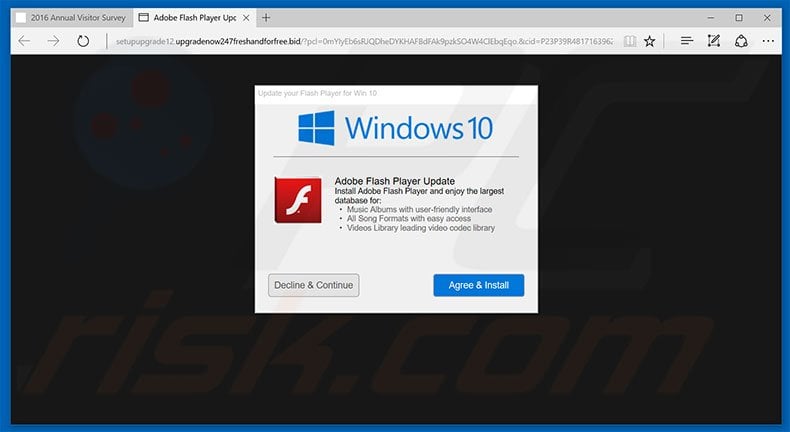
"Adobe Flash Player Update" scam overview
The "Adobe Flash Player Update" pop-up states that Adobe Flash Player is out-of-date and must be updated. Be aware, however, that this pop-up is not genuine and attempts to trick users into installation.
Rather than updating Adobe Flash Player, these set-ups can install a number of additional PUAs as well as rogue browser extensions (which modify browsers' settings, gather data, etc.). Therefore, never trust these pop-ups or update your applications with third-party tools, since that can lead to high-risk system infections.
Adware-type PUAs deliver various intrusive advertisements, e.g., banners, pop-ups, coupons, etc. To achieve this, developers employ a "virtual layer'" (a tool that enables placement of third-party graphical content on any visited site). Thus, displayed ads can conceal underlying content, thereby significantly diminishing the browsing experience.
In addition, unwanted apps might cause redirects to malicious websites - in which even an accidental click can result in system infections. Another downside is information tracking. PUAs typically gather data like - Internet Protocol (IP) addresses, search queries, URLs visited, pages viewed, and so on.
The data might be personally identifiable. Furthermore, the information can be shared by the developers with third-parties who might misuse it to generate revenue. Therefore, the presence of data-tracking apps on systems can lead to serious privacy issues, financial loss, or even identity theft. All potentially unwanted applications must be uninstalled immediately.
| Name | Adobe Flash Player Update virus |
| Threat Type | Phishing, Scam, Social Engineering, Fraud |
| Fake Claim | Pop-up messages claim that the Adobe Flash Player is outdated/missing and encourages users to install it. This is being done to trick users into running malicious setups that inject various unwanted applications and browser extensions. |
| Detection Names (adobe_flash_player_1840612795.exe) | Avast (FileRepMalware [PUP]), AVG (FileRepMalware [PUP]), ESET-NOD32 (Win32/InstallCore.AYH Potentially Unwanted), Microsoft (Trojan:Win32/Wacatac.B!ml), Full List Of Detections (VirusTotal) |
| Symptoms | Fake error messages, fake system warnings, pop-up errors, hoax computer scan. |
| Distribution methods | Compromised websites, rogue online pop-up ads, potentially unwanted applications. |
| Damage | Loss of sensitive private information, monetary loss, identity theft, possible malware infections. |
| Malware Removal (Windows) |
To eliminate possible malware infections, scan your computer with legitimate antivirus software. Our security researchers recommend using Combo Cleaner. Download Combo CleanerTo use full-featured product, you have to purchase a license for Combo Cleaner. 7 days free trial available. Combo Cleaner is owned and operated by RCS LT, the parent company of PCRisk.com. |
Online scams in general
The Internet is full of fake pop-ups similar to "Adobe Flash Player Update", including Call Technical Support Immediately, Internet Security Damaged, and Your Windows Computer Has Been Blocked. These are just some examples from an extensive list. It must be emphasized that claims about the system being damaged and other similar errors - are fake.
Cyber criminals attempt to trick victims into calling and paying for services that are not needed. All PUAs are very similar. By offering 'useful features', these apps often trick users into believing that they are legitimate and useful. In fact, unwanted applications only deliver intrusive ads, hijack browsers, cause redirects, and collect personal information.
How did potentially unwanted applications install on my computer?
PUAs are distributed using a deceptive marketing method called "bundling" - stealth installation of unwanted apps together with regular software. Developers know that users often rush the download/installation processes and skip most steps. Therefore, bundled programs are concealed within the "Custom/Advanced" section of these processes. By skipping this section, users expose their systems to risk of various infections and compromise their privacy.
How to avoid installation of potentially unwanted applications?
There are two simple steps you should take to prevent system infiltration by PUAs. Firstly, analyze each download/installation step using the "Custom" or "Advanced" settings. Secondly, decline offers to download/install third party software. The key to computer safety is caution.
Text presented within "Adobe Flash Player Update" pop-up:
Adobe Flash Player Update
Install Adobe Flash Player and enjoy the largest database for:
Music Albums with user-friendly interface
All Song Formats with easy access
Videos Library leading video codec library
Screenshot of "Adobe Flash Player Update" installer set-up promoting various potentially unwanted applications:
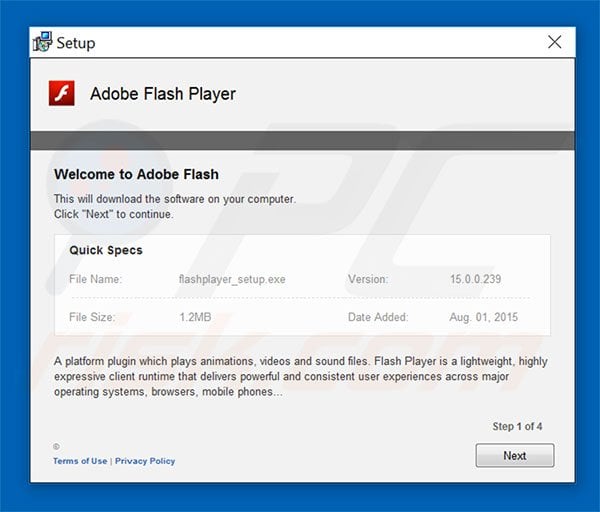
Other variants of "Adobe Flash Player Update" pop-up:
A variant of a fake adobe flash player update pop-up that spreads ransomware (at time of testing this fake pop-up was spreading .CRAB ransomware):

Fake flash player update promoting spyware targeted at Android users (users who launch this fake flash player update on their phones are risking to lose their social media logins, banking credentials, etc.):
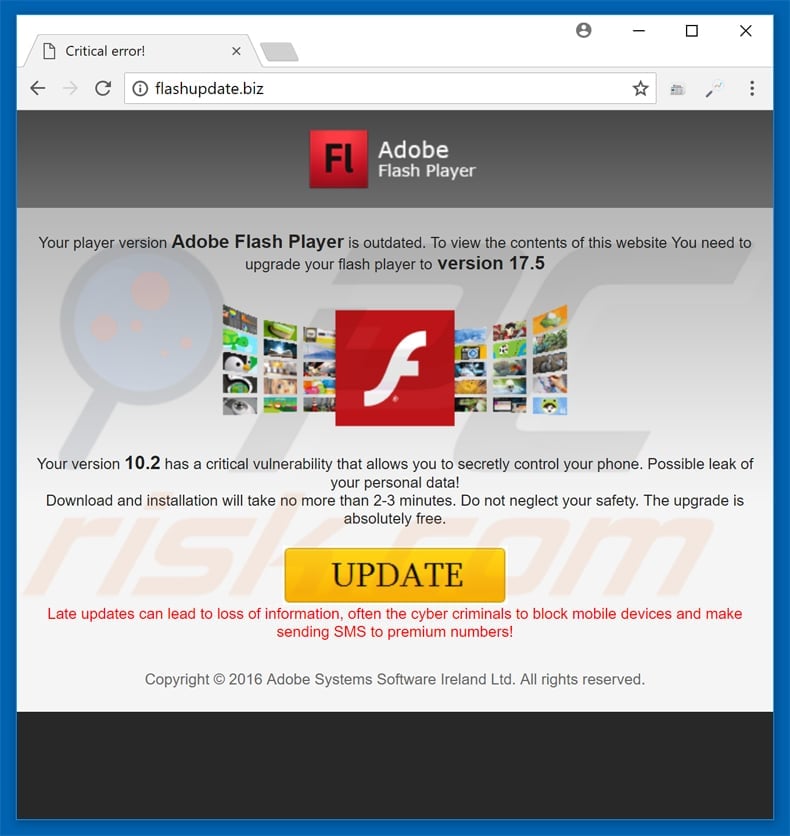
Text presented in this fake pop-up:
Your player version Adobe Flash Player is outdated. To view the contents of this website You need to upgrade your flash player to version 17.5
Your version 10.2 has a critical vulnerability that allows you to secretly control your phone. Possible leak of your personal data!
Download and installation will take no more than 2-3 minutes. Do not neglect your safety. The upgrade is absolutely free.
Late updates can lead to loss of information, often the cyber criminals to block mobile devices and make sending SMS to premium numbers!
Copyright © 2016 Adobe Systems Software Ireland Ltd. All rights reserved.
Another deceptive website claiming that the Adobe Flash Player is outdated and promoting Power Search browser hijacker:
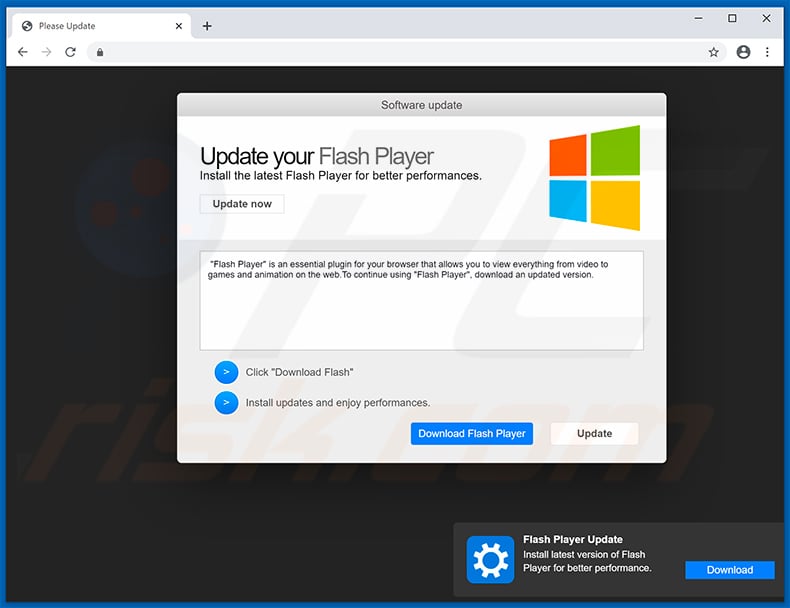
Text presented within this website:
Software update
Update your Flash Player
Install the latest Flash Player for better performances.
Update now
"Flash Player" is an essential plugin for your browser that allows you to view everything from video to games and animation on the web.To continue using "Flash Player", download an updated version.
> Click "Download Flash"
> Install updates and enjoy performances.
Download Flash Player UpdateFlash Player Update
Install the latest version of Flash Player for better performance.
Download
Appearance of this website (GIF):
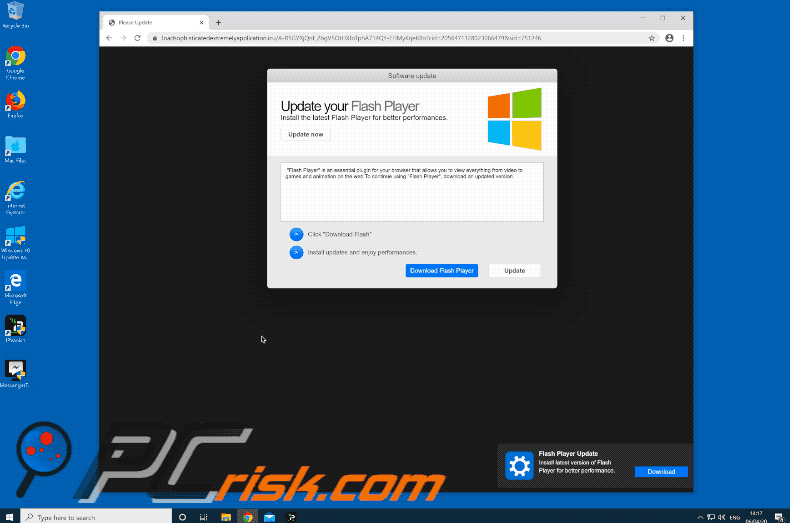
Yet another example of Adobe Flash Player Update-themed scam website:
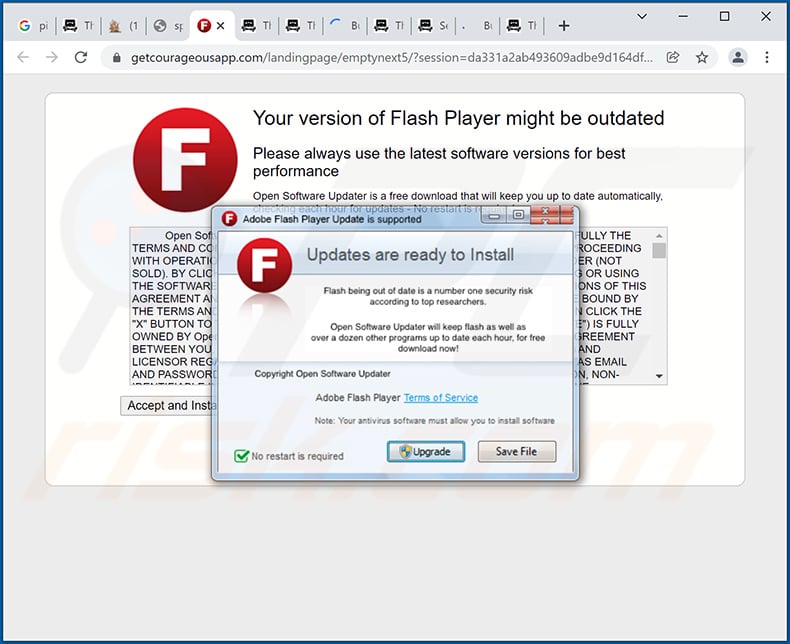
Text presented within:
Adobe Flash Player Update is supported
Updates are ready to Install
Flash being out of data is a number one security risk according to top researchers.
Open Software Updater will keep flash as well as over a dozen other programs up to date each hour, for free download now!
Copyright Open Software Updater
Adobe Flash Player Terms of Service
Note: Your antivirus software must allow you to instal lsoftware
No restart is required
[Upgrade] [Save File]
Instant automatic malware removal:
Manual threat removal might be a lengthy and complicated process that requires advanced IT skills. Combo Cleaner is a professional automatic malware removal tool that is recommended to get rid of malware. Download it by clicking the button below:
DOWNLOAD Combo CleanerBy downloading any software listed on this website you agree to our Privacy Policy and Terms of Use. To use full-featured product, you have to purchase a license for Combo Cleaner. 7 days free trial available. Combo Cleaner is owned and operated by RCS LT, the parent company of PCRisk.com.
Quick menu:
- What is Adobe Flash Player Update virus?
- How to identify a pop-up scam?
- How do pop-up scams work?
- How to remove fake pop-ups?
- How to prevent fake pop-ups?
- What to do if you fell for a pop-up scam?
How to identify a pop-up scam?
Pop-up windows with various fake messages are a common type of lures cybercriminals use. They collect sensitive personal data, trick Internet users into calling fake tech support numbers, subscribe to useless online services, invest in shady cryptocurrency schemes, etc.
While in the majority of cases these pop-ups don't infect users' devices with malware, they can cause direct monetary loss or could result in identity theft.
Cybercriminals strive to create their rogue pop-up windows to look trustworthy, however, scams typically have the following characteristics:
- Spelling mistakes and non-professional images - Closely inspect the information displayed in a pop-up. Spelling mistakes and unprofessional images could be a sign of a scam.
- Sense of urgency - Countdown timer with a couple of minutes on it, asking you to enter your personal information or subscribe to some online service.
- Statements that you won something - If you haven't participated in a lottery, online competition, etc., and you see a pop-up window stating that you won.
- Computer or mobile device scan - A pop-up window that scans your device and informs of detected issues - is undoubtedly a scam; webpages cannot perform such actions.
- Exclusivity - Pop-up windows stating that only you are given secret access to a financial scheme that can quickly make you rich.
Example of a pop-up scam:

How do pop-up scams work?
Cybercriminals and deceptive marketers usually use various advertising networks, search engine poisoning techniques, and shady websites to generate traffic to their pop-ups. Users land on their online lures after clicking on fake download buttons, using a torrent website, or simply clicking on an Internet search engine result.
Based on users' location and device information, they are presented with a scam pop-up. Lures presented in such pop-ups range from get-rich-quick schemes to fake virus scans.
How to remove fake pop-ups?
In most cases, pop-up scams do not infect users' devices with malware. If you encountered a scam pop-up, simply closing it should be enough. In some cases scam, pop-ups may be hard to close; in such cases - close your Internet browser and restart it.
In extremely rare cases, you might need to reset your Internet browser. For this, use our instructions explaining how to reset Internet browser settings.
How to prevent fake pop-ups?
To prevent seeing pop-up scams, you should visit only reputable websites. Torrent, Crack, free online movie streaming, YouTube video download, and other websites of similar reputation commonly redirect Internet users to pop-up scams.
To minimize the risk of encountering pop-up scams, you should keep your Internet browsers up-to-date and use reputable anti-malware application. For this purpose, we recommend Combo Cleaner Antivirus for Windows.
What to do if you fell for a pop-up scam?
This depends on the type of scam that you fell for. Most commonly, pop-up scams try to trick users into sending money, giving away personal information, or giving access to one's device.
- If you sent money to scammers: You should contact your financial institution and explain that you were scammed. If informed promptly, there's a chance to get your money back.
- If you gave away your personal information: You should change your passwords and enable two-factor authentication in all online services that you use. Visit Federal Trade Commission to report identity theft and get personalized recovery steps.
- If you let scammers connect to your device: You should scan your computer with reputable anti-malware (we recommend Combo Cleaner Antivirus for Windows) - cyber criminals could have planted trojans, keyloggers, and other malware, don't use your computer until removing possible threats.
- Help other Internet users: report Internet scams to Federal Trade Commission.
Frequently Asked Questions (FAQ)
What is a pop-up scam?
Pop-ups scams are deceptive messages designed to trick users into performing specific actions, e.g., downloading files, installing or purchasing software, revealing personal data, calling fake helplines, and so on.
What is the purpose of a pop-up scam?
Typically, pop-up scams only aim to generate revenue for the designers. Cyber criminals can profit by misusing or selling sensitive information disclosed by victims, receiving monetary transactions obtained via deception, promoting dubious software (e.g., fake anti-viruses, etc.), proliferating malware, and so forth.
Why do I encounter fake pop-ups?
Pop-up scams are promoted on rogue websites. These sites are usually accessed via mistyped URLs or redirects caused by suspect webpages, browser notifications/ intrusive adverts, or untrustworthy software installed onto users' devices.
Will Combo Cleaner protect me from pop-up scams?
Combo Cleaner can scan visited websites and detect rogue and malicious ones (including those running pop-up scams). Hence, if a harmful site is accessed - Combo Cleaner will alert you, and access to the webpage will be restricted.
Share:

Tomas Meskauskas
Expert security researcher, professional malware analyst
I am passionate about computer security and technology. I have an experience of over 10 years working in various companies related to computer technical issue solving and Internet security. I have been working as an author and editor for pcrisk.com since 2010. Follow me on Twitter and LinkedIn to stay informed about the latest online security threats.
PCrisk security portal is brought by a company RCS LT.
Joined forces of security researchers help educate computer users about the latest online security threats. More information about the company RCS LT.
Our malware removal guides are free. However, if you want to support us you can send us a donation.
DonatePCrisk security portal is brought by a company RCS LT.
Joined forces of security researchers help educate computer users about the latest online security threats. More information about the company RCS LT.
Our malware removal guides are free. However, if you want to support us you can send us a donation.
Donate
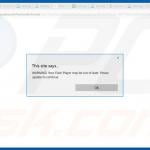
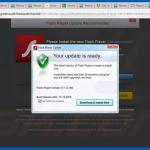
▼ Show Discussion